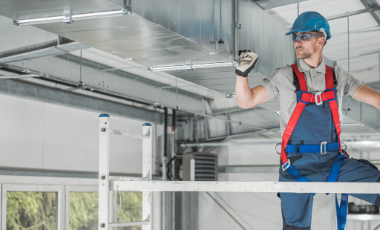Top 10 HVAC Maintenance Tips for Every Season
Your HVAC system plays a crucial role in keeping your home comfortable throughout the year. However, without proper maintenance, it can become less efficient, leading to higher energy bills and potential breakdowns. To ensure your HVAC system operates at its best, it’s important to perform regular maintenance tasks for each season. In this article, we will provide you with the top 10 HVAC maintenance tips for every season, covering spring, summer, fall, and winter.
Spring HVAC Maintenance Tips
1. Change the air filters: As spring arrives, it’s essential to start with a fresh set of air filters. Dirty filters can restrict airflow, reducing the efficiency of your HVAC system. According to the U.S. Department of Energy, replacing a clogged filter with a clean one can lower your air conditioner’s energy consumption by 5% to 15%.
2. Clean the outdoor unit: Over the winter, debris such as leaves, twigs, and dirt can accumulate around your outdoor unit. Clearing this debris and ensuring proper airflow is crucial for the efficient operation of your HVAC system. Use a garden hose to gently clean the unit and remove any dirt or debris.
3. Schedule a professional tune-up: Spring is the perfect time to schedule a professional HVAC tune-up. A qualified technician will inspect your system, clean the coils, check refrigerant levels, and ensure all components are in good working condition. Regular tune-ups can extend the lifespan of your HVAC system and prevent costly repairs.
4. Check the thermostat settings: As the weather warms up, adjust your thermostat settings to optimize energy efficiency. Consider installing a programmable thermostat that allows you to set different temperatures for different times of the day. This can help you save on energy costs by automatically adjusting the temperature when you’re away from home.
Summer HVAC Maintenance Tips
1. Clean the condenser coils: The condenser coils in your outdoor unit can become dirty and clogged with debris, reducing the efficiency of your air conditioner. Cleaning the coils with a soft brush or a vacuum cleaner can improve airflow and prevent overheating. According to the U.S. Department of Energy, dirty coils can increase energy consumption by up to 30%.
2. Check refrigerant levels: Low refrigerant levels can indicate a leak in your system, which can lead to reduced cooling capacity and increased energy consumption. It’s important to have a professional HVAC technician check and recharge the refrigerant if necessary. According to the Environmental Protection Agency, a 10% refrigerant undercharge can increase operating costs by 20%.
3. Inspect and clean the air ducts: Over time, dust, dirt, and debris can accumulate in your air ducts, reducing airflow and indoor air quality. Inspect the ductwork for any leaks or damage and clean them if necessary. Consider hiring a professional duct cleaning service to ensure thorough cleaning and improved air quality.
4. Keep the outdoor unit clear: During the summer, ensure that the area around your outdoor unit is clear of any vegetation, debris, or obstructions. Proper airflow is essential for the efficient operation of your air conditioner. Trim any nearby bushes or plants and keep a clear space of at least two feet around the unit.
Fall HVAC Maintenance Tips
1. Clean and inspect the furnace: Before the heating season begins, clean the furnace and inspect it for any signs of damage or wear. Replace the air filter and ensure that all vents are clear of obstructions. A clean and well-maintained furnace will operate more efficiently and provide better indoor air quality.
2. Check the carbon monoxide detector: As you start using your furnace, it’s crucial to ensure that your carbon monoxide detector is in good working condition. Carbon monoxide is a colorless and odorless gas that can be produced by malfunctioning furnaces. Test the detector and replace the batteries if necessary.
3. Seal air leaks: Inspect your home for any air leaks around windows, doors, and electrical outlets. Sealing these leaks with caulk or weatherstripping can prevent drafts and improve energy efficiency. According to the U.S. Department of Energy, sealing air leaks can save you up to 20% on heating and cooling costs.
4. Schedule a professional inspection: Fall is an ideal time to schedule a professional HVAC inspection. A qualified technician will check the entire system, including the furnace, ductwork, and thermostat, to ensure everything is in proper working order. Regular inspections can catch potential issues before they become major problems.
Winter HVAC Maintenance Tips
1. Change the air filters: Just like in the spring, it’s important to start the winter season with clean air filters. Dirty filters can restrict airflow and reduce the efficiency of your heating system. According to the U.S. Environmental Protection Agency, replacing dirty filters can save you 5% to 15% on heating costs.
2. Clean the vents and registers: Over time, dust and debris can accumulate in your vents and registers, obstructing airflow and reducing heating efficiency. Use a vacuum cleaner or a brush to clean the vents and registers, ensuring proper airflow and heat distribution.
3. Insulate exposed pipes: Freezing temperatures can cause pipes to burst, leading to costly repairs. Insulate any exposed pipes in unheated areas such as basements, attics, and crawl spaces. This will help prevent freezing and ensure a continuous water supply.
4. Consider a programmable thermostat: Installing a programmable thermostat can help you save on heating costs by automatically adjusting the temperature when you’re away from home or asleep. Set the thermostat to lower temperatures at night or when you’re not at home, and raise it when you need more warmth.
In conclusion, regular HVAC maintenance is essential for the efficient operation of your system and can help you save on energy costs. By following these top 10 HVAC maintenance tips for every season, you can ensure that your HVAC system operates at its best throughout the year. Remember to change air filters regularly, clean the outdoor unit, schedule professional tune-ups, and adjust thermostat settings accordingly. With proper maintenance, your HVAC system will provide you with optimal comfort and energy efficiency for years to come.


